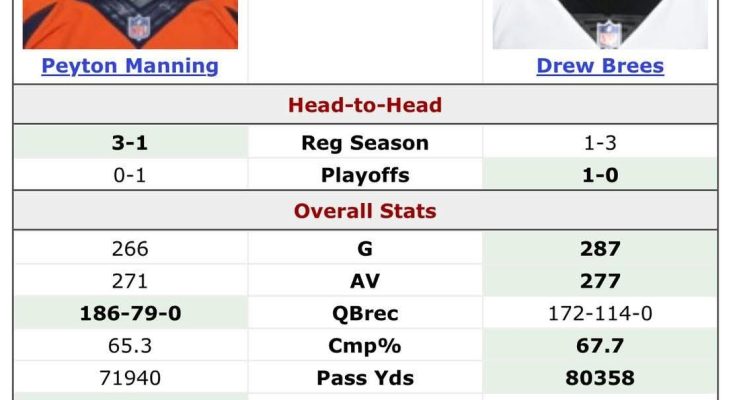It’s time to have the uncomfortable conversation that many NFL fans, analysts, and historians have danced around for years. While Peyton Manning is often brought up in the greatest-of-all-time quarterback discussions—deservedly so—it’s time to acknowledge a truth that has been quietly building over the course of two legendary careers: Drew Brees was, and is, the better all-time quarterback. This isn’t just fan-driven bias or contrarianism for its own sake. The numbers, the consistency, the leadership, the circumstances, and the complete body of work over two decades all support the argument. If the goal is to evaluate a quarterback’s entire career with as much objectivity as possible—especially based on production, value, and what each one brought to their teams over the long haul—then Brees deserves to be recognized above Manning.
Let’s begin with the most obvious piece: statistical production. Brees retired as the NFL’s all-time leader in passing yards, completions, and completion percentage. He held the touchdowns record until it was narrowly surpassed by Tom Brady near the end of both of their careers. Manning was the yardage king for a brief period, but Brees obliterated the record books through consistency and sustained excellence. Brees passed for over 5,000 yards in a season five times. Manning did it once. And it wasn’t a fluke of playing in a pass-happy era—Brees played in an offense where he was the system, not a byproduct of it. Brees’ peak wasn’t just a few magical seasons; it spanned more than a decade of dominance. From 2006 to 2016, he averaged over 4,800 passing yards and 34 touchdowns per season. Manning had monster years—especially his 2013 MVP season in Denver—but his peak was more concentrated and, ultimately, less sustainable.
One could argue that Manning was more prolific in terms of MVP awards, winning five to Brees’ zero. But awards are narrative-driven, often skewed by preseason expectations and team records. Brees was often penalized in MVP voting for his defense letting him down, or for sharing the spotlight in years where Brady or Rodgers surged late. But in reality, no quarterback was more consistently elite over the span of fifteen years than Brees. The MVPs may be on Manning’s mantle, but the week-to-week, year-to-year output was more impressive from Brees. His command of the offense, accuracy, and ability to produce with varying levels of talent around him should be viewed as more valuable than stacking MVPs during periods of dominance on loaded rosters.
Speaking of rosters, let’s talk about the context in which each quarterback succeeded. Peyton Manning was drafted No. 1 overall to a franchise that was built around him, and stayed in a dome with a Pro Bowl receiver duo (Marvin Harrison and Reggie Wayne), Hall of Fame running back (Edgerrin James), and a front office willing to invest heavily in building around him. Later in Denver, he joined an elite defense and a core of weapons like Demaryius Thomas and Emmanuel Sanders. That’s not to say Manning didn’t elevate those players—he did—but he often had elite support. Brees, meanwhile, was cast off by San Diego due to injury concerns, landing in New Orleans—one of the most hopeless franchises in NFL history at the time. The Saints had never won a Super Bowl. They had just endured Hurricane Katrina. The Superdome was a symbol of both devastation and hope. And then in walked Drew Brees, who not only revitalized the team, but elevated the entire city.
Brees’ impact in New Orleans transcends statistics. He didn’t just win games—he changed the identity of a team and made them a perennial contender. Yes, Sean Payton’s offensive system was important, but it only worked because of Brees’ intelligence, accuracy, and relentless preparation. The Saints led the NFL in scoring multiple times during Brees’ tenure, and he carried mediocre defenses year after year to winning seasons. Consider that Brees had a bottom-tier defense for most of his prime and still led his teams to 7-9, 8-8, and 9-7 records, often dragging the team into playoff contention. Manning, when given similarly poor defensive support, struggled—particularly in the playoffs.
And this brings us to postseason performance. On the surface, Manning has two Super Bowl rings to Brees’ one. That seems like a clear edge. But it’s not so simple. Manning’s first ring came against a wildly overmatched Bears team led by Rex Grossman. His second came as a passenger on a dominant Broncos defense. In that Super Bowl win over Carolina, Manning threw for 141 yards, one interception, and a passer rating below 60. He was barely functional at that stage of his career, and while he deserves credit for leadership, he didn’t win that Super Bowl so much as he happened to be the starting quarterback on a team that did. Meanwhile, Brees’ lone ring came in one of the most memorable, strategic, and high-stakes Super Bowl wins in recent memory. He outdueled Peyton Manning in Super Bowl XLIV, completing 32 of 39 passes and leading a 15-point second-half comeback. He threw for nearly 300 yards and two touchdowns, and he executed one of the greatest onside kick gambles in NFL history to change the game’s momentum.
In the playoffs overall, Manning was often criticized for underperformance. He finished his career with a 14-13 postseason record and multiple one-and-done appearances as the top seed. His playoff passer rating is pedestrian compared to his regular season dominance. Brees didn’t have a stellar playoff resume either—9-9 in his career—but context matters. He often lost playoff games where he played exceptionally well, only to be let down by his defense (see the 2011 Divisional Round vs. San Francisco) or by heartbreak (the Minneapolis Miracle, the no-call vs. the Rams). Brees’ playoff numbers stack up comparably to Manning’s, but without the late-career fall-off in performance. Even in his final years, Brees remained effective, despite declining arm strength and mounting injuries.
Durability is another key area where Brees eclipses Manning. Aside from a major shoulder injury in 2005 and a few late-career rib issues, Brees was an iron man. He started 15 or more games in 16 of his 20 NFL seasons. Manning, on the other hand, missed an entire season due to neck surgery and was never the same player after returning. Brees’ ability to stay healthy and effective into his 40s is a testament to his conditioning, preparation, and adaptability. He adjusted his game as he aged, becoming more efficient and mastering the short-to-intermediate game with pinpoint accuracy. Manning’s game fell off sharply once his physical gifts deteriorated.
Leadership and intangibles? Both were legendary leaders, but Brees had a unique ability to connect with his teammates, his city, and the game itself in a way that inspired universal respect. He wasn’t just the face of a franchise—he became a civic icon, a symbol of resilience. Manning was an unmatched film junkie and play-caller, but Brees was just as cerebral and arguably more innovative in how he executed the offense on the field. His anticipation, timing, and ability to find throwing lanes at barely six feet tall remain unparalleled.
Another overlooked element is Brees’ accuracy. He retired with the highest completion percentage in NFL history. He wasn’t dinking and dunking either; he led the league in yards per attempt multiple times and was highly effective down the field. His mechanics, footwork, and ability to hit receivers in stride were masterful. Manning was known for his pre-snap brilliance and command of the offense, but Brees was just as adept post-snap, especially when it came to reading defenses and delivering precise passes under pressure.
And then there’s the sheer volume. More than 80,000 career passing yards. Over 7,000 completions. These aren’t just empty stats—they’re a reflection of excellence, availability, and trust. Coaches trusted Brees to throw the ball 40 times a game, week in and week out, because they knew he’d make the right decisions. He wasn’t the most physically gifted. He didn’t have the biggest arm or the fastest 40 time. But he got more out of his tools than any quarterback in history. Manning was a prodigy, a natural talent with every resource and advantage. Brees was overlooked, doubted, discarded—and became the most prolific passer the game has ever seen.
Ultimately, it comes down to this: if you were starting a franchise and wanted two decades of elite quarterback play, leadership, and reliability, the better choice would be Drew Brees. Not the flashiest. Not the most marketable. But the most dependable. The most productive. The most resilient. Peyton Manning will always be in the GOAT conversation. He deserves to be. But if we strip away the hype and look at the full scope of impact, numbers, performance, and consistency, it’s clear: Drew Brees was better. Not louder. Not more decorated. Just better. And it’s time we said it out loud.



